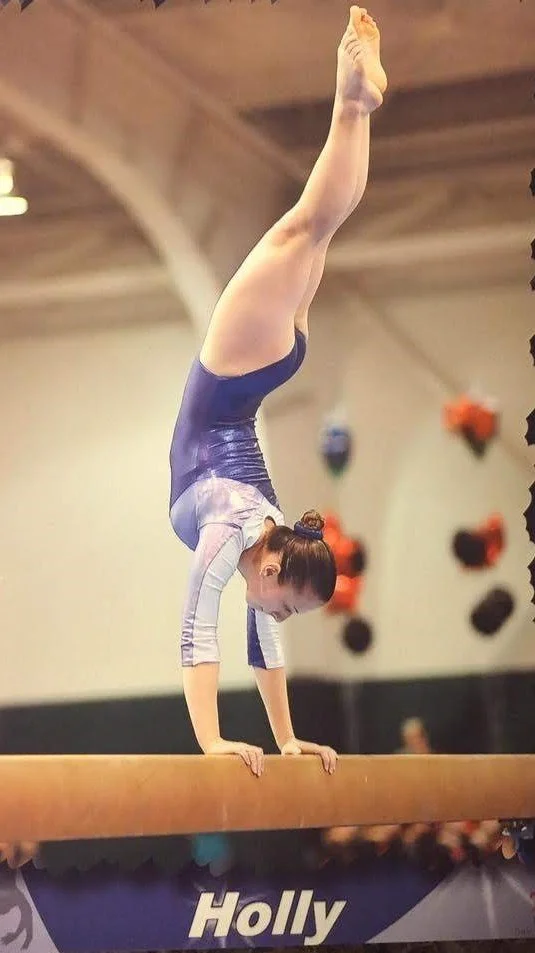What Running Taught Me That Gymnastics Couldn’t
I spent 14 years as a competitive gymnast. I could throw my body through the air, stick a landing, and overcome injuries. But when I turned to running, I realized I hadn’t been using my whole self - mind, body, and soul, to be an athlete.
When I decided post-college to run a half marathon by 25, I brought my gymnastics brain with me. And while that discipline and grit eventually helped me drop my marathon time from 5:03 to 3:15 and my half from 2:28 to 1:32, it also led me down some painful, frustrating detours.
Here are the three biggest lessons running taught me that gymnastics never could—and what finally clicked when I got it right.
Lesson #1: Not Every Effort Needs to Be a Performance
In gymnastics, perfection DOES exist. The whole scoring system is based on that.
So when I started running, I approached every single workout the same way. If the plan said "5 miles," I'd run those 5 miles, or more, as hard as I could. If I didn’t exceed past the pace it told me to run in a quality session, did it even account?
The life of a gymnast, and all the sequins and sweat.
The result? I was constantly tired, frequently injured, and I was wondering why I couldn't break through.
What running taught me: Easy runs aren't junk miles—they're the foundation. They build aerobic capacity, allow for recovery, and you truly do get faster from them. The magic happens when you stop treating every run like a test and start trusting the process. Most of your miles should feel easy.
Gymnastics taught me how to push when it matters. Running taught me how to build every day.
Lesson #2: Mental Endurance Is a Different Beast Than Mental Toughness
Gymnastics is hard, but it's short. Even your longest routine is 90 seconds. You can grit your teeth, hold your breath, and power through almost anything for 90 seconds.
Running a marathon? That's hours of managing discomfort, doubt, and the voice in your head that starts bargaining around mile 18, or maybe 4 (just me?). No amount of physical training prepared me for that mental endurance.
In my first marathon, my body was ready. My mind wasn't. When things got hard around mile 16, I didn't have the tools to push through. I'd never practiced managing discomfort for that long. The difference being discomfort vs. danger.
What running taught me: With the help of my sports psychologist (yay, therapy!), I started training my mind as deliberately as I trained my body. I practiced mantras on long runs. I visualized different race scenarios, especially the bad, and rehearsed how I'd respond. I finally took the advice of a very wise friend (thanks, AC) and smiled every mile.
Gymnastics taught me mental toughness. Running taught me mental endurance.
Lesson #3: Progress Rewards Patience More Than Intensity
In gymnastics, if you want to learn a new skill, you drill it. Over and over and over. You throw yourself at it until your body figures it out. Progress can happen in weeks, even days.
I brought that same intensity to running. I wanted to run faster, so I ran hard. Every week. Sometimes multiple times a week. I'd see a training plan and think, "But what if I just did more?"
The result? Burnout, injury, and frustration. I'd have a great training block, then get hurt and lose weeks of progress. I'd push through fatigue and wonder why my times weren't dropping.
What running taught me: Your body adapts over months and years, not days and weeks. The runners who improve the most aren't the ones who train the hardest—they're the ones who train consistently, who respect recovery, who understand that adaptation takes time.
I had to unlearn the gymnastics instinct to force progress and instead trust that showing up steadily, week after week, would get me there. And it did.
Gymnastics taught me intensity. Running taught me patience.
What This Means for You
If you're coming from another sport, you're bringing strengths with you: discipline, body awareness, mental toughness. But you might also be bringing habits that don't serve you in running.
If you've been spinning your wheels, ask yourself:
Am I running too hard on easy days because I don't trust that "easy" works?
Have I trained my mind for the long haul, or just my legs?
Am I trying to force progress instead of trusting the process?
Am I forcing too much stress in my day when life is telling me to rest?
These were the shifts that took me from a PR-only focused runner to someone who genuinely loves this sport and what it's taught me. Now, as a coach, these are the patterns I help my clients recognize and reframe.
Because the goal isn't just to run faster. It's to run with purpose, with endurance, and with joy.
Ready to train smarter, not just harder? Let's talk about what's possible when you bring purpose to your training.


